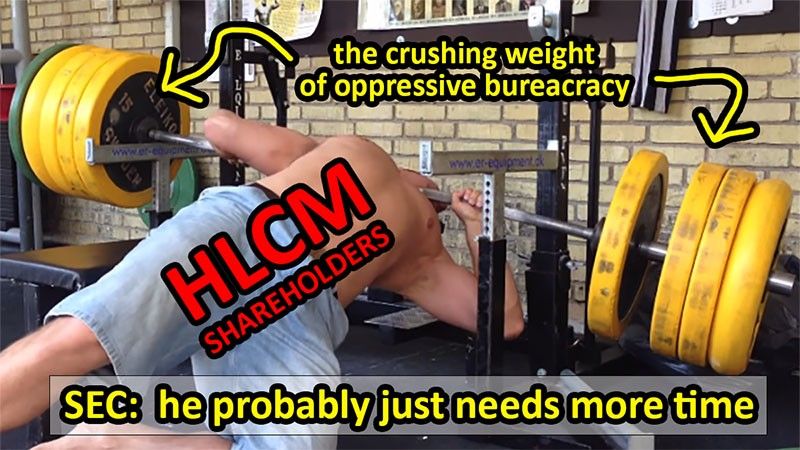SEC orders Holcim to conduct a second tender offer

Holcim PH [HLCM suspended] [link] disclosed that its ownership group received a letter from the SEC ordering it to conduct a second tender offer “of the remaining minority shares” of HLCM. The SEC order directs Holderfin, the ownership company that initiated the original tender offer, to conduct the second tender offer “within twenty calendar days from receipt of the order”, with an offer period of 30 calendar days, and “without prejudice to the consummation and payment for the tender offer concluded in the first round.” In its disclosure, HLCM said that Holderfin has sought clarification on the prejudice portion of the order.
> How did we get here? Holderfin is a corporation that is a part of HLCM’s foreign ownership group, and it kicked everything off by buying a 9.22% stake in HLCM from Sumitomo Osaka Cement. Since Holderfin is part of the ownership group, whatever shares it owns are not counted as “public” when calculating HLCM’s public float, and the stake purchase therefore pushed HLCM’s public float down to 5.05%, which is below the PSE’s minimum public ownership requirement. The PSE (appropriately) suspended trading in HLCM shares. Then Holderfin announced that it would conduct a tender offer to purchase the remainder of the public float with the intention of voluntarily delisting HLCM from the PSE. The tender offer ran from July 10 to August 30, with settlement scheduled for September 13.
> Ok, so what’s the problem? The PSE objected to Holderfin’s order of operations. Because Holderfin initiated the tender offer while HLCM was suspended for a float violation, the PSE said that any settlement of the tender offer would need to be processed outside of the PSE’s system. Any shares that are traded while a company is suspended for a float violation are subject to special tax treatment regulations by the BIR, so minority shareholders who wanted to participate in the tender offer would need to personally pay the capital gains tax and documentary stamp tax on the sale of the shares (at great personal expense of time and effort), instead of just paying the routine “standard stock transaction” tax that requires no effort on the part of the minority shareholder at all.
> What was the result of the first tender offer? I can’t find any information on how many of HLCM’s minority shareholders were able to jump through all of the bureaucratic red tape to actually participate in the tender offer. There must be a considerable amount of behind-the-scenes discussion between the brokerages, HLCM, Holderfin, the SEC, and the PSE that prompted this order by the SEC, but we are unfortunately not privy to any of that information.
> Why is the SEC doing this? The SEC says that it ordered a second tender offer because of “the request of investors for the extension of the tender offer period.” The SEC added that a second tender offer would give minority shareholders “more time to decide whether they will remain invested in the company, and to prepare the documents necessary.”
> Do shareholders really need more time to decide? Not really. The vast majority of the HLCM shareholders that I’ve spoken to about this over the past three months have known, almost immediately upon hearing the news of the tender offer, that they would like to tender their shares to Holderfin. This is not a Metro Pacific &MPI situation, where shareholders had a reasonable hope for a second (better) offer, or where there might be significant upside to remaining a shareholder in HLCM post-tender. I conducted a HLCM Tender Offer survey, and out of 45 readers who self-reported being HLCM shareholders, 91% said (back in July) that they would tender. This part of the SEC’s reasoning appears to lack a real-world foundation.
> Ok, do shareholders need more time to prep the documents? This is a far more interesting question. While I didn’t ask about this issue in my survey, I have received several long emails from small-time investors who hold relatively small positions (total value between P15,000 and P50,000) who are simply not able to take the time away from their families or their jobs to jump through the many hoops needed to accomplish a private sale. While these positions might be small in the grand scheme, they are significant enough for these investors to cause a deep sense of sadness. A few even regretted putting money into the stock market to begin with, and told me that they would close their accounts because they weren’t aware that this kind of outcome was a possibility. So, the order does technically give these people more time to prepare the documents, but “more time” wasn’t the problem that small-time investors were telling me about in their emails to me. They just wanted to do the transaction as they expected, which is to participate in the tender and have the PSE’s system facilitate the transfer of shares with the regular standard stock transfer tax.
> What does a second tender accomplish? I’m not sure. Under the voluntary delisting rules, the ownership group only needed to acquire enough shares through the tender offer to have an aggregate ownership of greater than 95% of HLCM’s outstanding shares. Since they entered the tender with 94.95% of the outstanding shares, Holderfin was offering to buy up to 325.5 million shares (the entirety of the 4.95% of the public float remaining), but all it needed to get was about 33.5 million to push its ownership level above 95% and satisfy its PSE requirements. Will additional time make those dejected small-time investors suddenly find the leave from work to stand in line and fill out triplicate forms to prevent the loss of P10,000 in HLCM stock? I doubt it. It’s nearly two weeks since the original tender offer period ended. Anyone still holding stock is likely doing so only because the process of doing that work is either impossible or so burdensome so as to be the functional equivalent of impossible. My suspicion is that HLCM probably already has enough shares from the original tender offer to delist, and that this second tender offer is a way for the PSE and SEC to save face and transfer the “blame” to minority shareholders for their own inability to complete the transaction.
> Who is to blame for this situation? The PSE’s argument that HLCM should have known the consequences of triggering a suspension before initiating a tender offer is valid. HLCM’s argument that the PSE should simply lift the suspension to permit the trading of its shares on the PSE’s facility is also valid. The BIR’s insistence on processing the transaction in accordance with the stated rule appears valid. And yet, the minority shareholders’ overwhelming dissatisfaction with how this whole process has gone is perhaps the most valid and persuasive. The minority shareholders are the only ones who are blameless in this situation, and are (interestingly) the only group that is negatively impacted by any of this.
MB bottom-line: This is one of those cases where there is no clear way forward, except to work toward a framework where something like this can’t happen again. I think that the PSE’s amended rules could accomplish that, but HLCM shareholders don’t care about how the next delisting will be handled; they care about how this delisting will be handled. Could the BIR make more money if they allowed the transaction to proceed under the standard transfer tax scheme? Probably. Could the PSE lift the HLCM suspension on its own accord to facilitate one exempted transaction, then write a rule to prevent it from happening again? Probably. Could the SEC do more for the minority shareholders in this situation? Undoubtedly. It’s as if the SEC heard the cries of someone struggling under the weight of a failed bench press in the gym, and instead of running over to help lift that weight off of the person, decided to simply do nothing to give that weight lifter “more time” to accomplish the lift. Because that’s exactly what they needed. More time. /s
---
Merkado Barkada is a free daily newsletter on the PSE, investing and business in the Philippines. You can subscribe to the newsletter or follow on Twitter to receive the full daily updates.
Merkado Barkada's opinions are provided for informational purposes only, and should not be considered a recommendation to buy or sell any particular stock. These daily articles are not updated with new information, so each investor must do his or her own due diligence before trading, as the facts and figures in each particular article may have changed.
- Latest

























